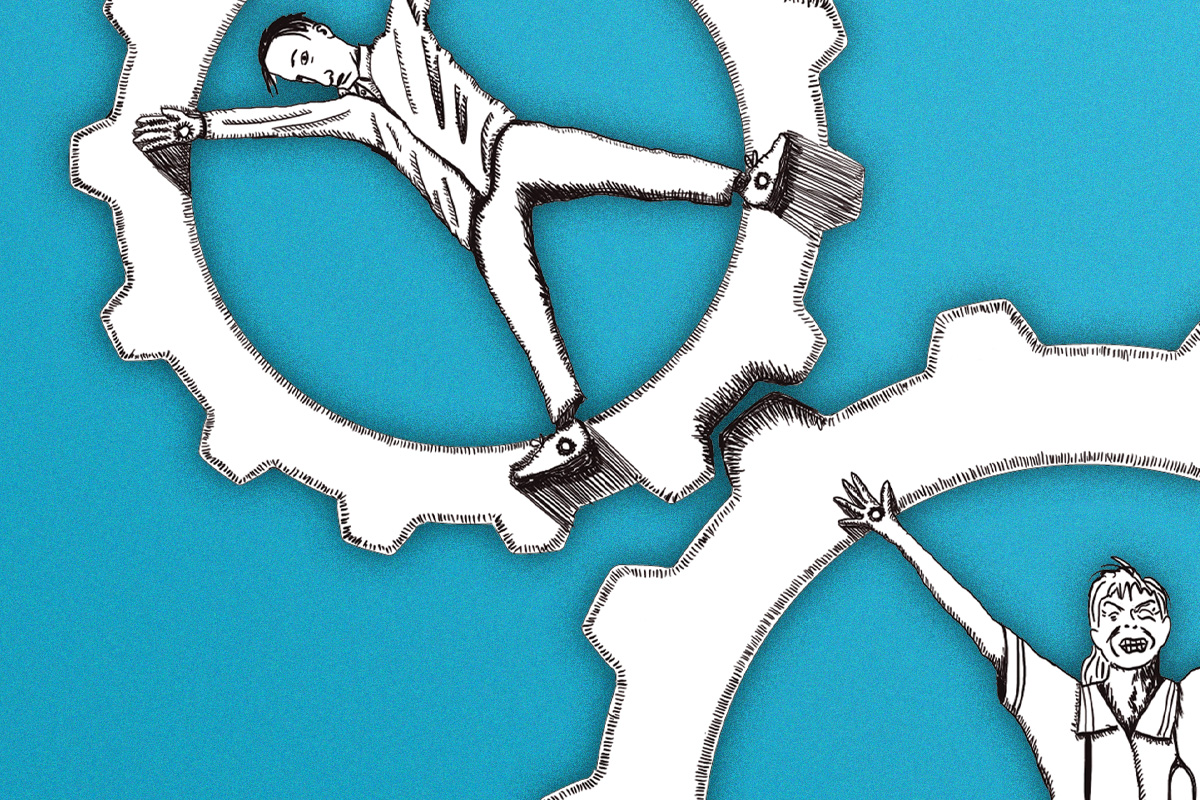The recent decline of the Corbyn and Sanders movements has led to a great deal of soul-searching on the left, as people try to pinpoint what exactly went wrong. As a result, it is not uncommon to find those who succumb to the twin pressures of sectarianism and opportunism in their search for what is to be done.
This is nothing new. In times of demoralisation, all sorts of weird and wonderful ideas can resurface, claiming to be a panacea for how to win the masses. This is especially the case among petty bourgeois academics, who – with no real grounding in the workers’ movement – lose their way the most easily.
One example of such opportunism can be found in a recent article from the self-described ‘Marxist’ magazine The Bellows, entitled ‘The Case for a Left Patriotism’. In this piece, writer Siddak Ahuja argues that the recent failures of both the Corbyn and Sanders movements can be boiled down to one simple problem: they alienated workers by failing to embrace patriotism.
Far from being an original position, this idea has a long history in the workers’ movement. Over the past few years, however, it has steadily gained some currency – even among those who claim to be on the left. For example, Labour MP Rebecca Long-Bailey made vague comments about ‘progressive patriotism‘ in her leadership campaign earlier this year.
More recently, Labour’s ‘new leadership’ have made it clear that pandering to patriotic sentiments will be a central plank of the party’s strategy.
Together we can make Britain the best place to grow up in and the best place to grow old in. pic.twitter.com/I7leGC1mMN
— The Labour Party (@UKLabour) September 23, 2020
At the recent Connected ‘conference’, shadow foreign secretary Lisa Nandy stated that “we stand up for Britain, we stand up for British people, we stand up for British interests and we will always put that first.”
This stance was given the blessing of Sir Keir Starmer, who remarked in his keynote speech that “we love this country as you do”.
The return of this flag-waving ‘Blue Labour’ rhetoric is no surprise. The leadership are keen to cast aside the class-based internationalism of the Corbyn period. To do so, they won’t think twice about trying to outflank the Tories on questions like national security and immigration.
This will be a fruitless endeavour. Far from rebuilding the ‘Red Wall’, all this will achieve is emboldening the most reactionary layers of British society, which can only bolster the ranks of the Tories.
For this reason, it is worth examining Ahuja’s arguments in favour of ‘left patriotism’; and, in doing so, drawing out a Marxist response.
What went wrong?
 In his article, the author claims that the Labour left’s internationalism was a key reason for the failure of the Corbyn movement.
In his article, the author claims that the Labour left’s internationalism was a key reason for the failure of the Corbyn movement.
He points to the “woke moralisms and virtue signalling” of left commentators like Owen Jones and Ash Sarker as being a major factor in the collapse of the Red Wall in the 2019 general election. By treating Brexit as a ‘culture war’, rather than a class issue, Ahuja says, the left effectively abandoned the working class and “relegated Labour to a party of the middle class”.
There is a grain of truth in what Ahuja puts forward here. The wide support for Brexit among working-class communities in the North did represent a raw expression of anti-establishment anger. Following decades of austerity and the gutting of Britain’s industry, the Leave campaign’s slogan of “taking back control” did resonate among certain layers of workers.
But this is only one half of the story. Many workers – particularly younger workers and those living in more diverse, urban areas – lent their support to the Remain campaign.
It would therefore be a mistake to portray the Brexit divide as a black-and-white “vote along class lines” as the author does.
The reality is that Brexit divided workers, precisely because neither camp represented the interests of the working class. Both campaigns were led by the Tories and big business politicians, representing opposing sections of the British ruling class. And neither had any interest in improving the lives of workers.
It is correct to point out that the Labour leadership’s back-tracking on the question of a second referendum cost them dearly in the 2019 election. But the conclusions Ahuja draws from this are wildly incorrect.
What is to be done?
 Having ‘diagnosed’ the problem, Ahuja wastes no time in pointing to Boris Johnson’s campaign as a model for the left.
Having ‘diagnosed’ the problem, Ahuja wastes no time in pointing to Boris Johnson’s campaign as a model for the left.
“By sticking to patriotism and mild [!] cultural conservatism, and adopting centre-left Keynesian economics,” the writer states, “Boris was able to outflank Corbyn from all sides and secure a thumping majority.”
Unwittingly or not, Ahuja sorely understates Johnson’s so-called “mild” conservatism. The Prime Minister has never made any attempt to hide his vitriol towards black people and Muslims. Moreover, the slew of racist deportations seen under the current Tory government reveal the deeply reactionary character of his agenda.
We may be tempted to give the author the benefit of the doubt. But his second model for the left betrays his complete lack of understanding on this matter. Ahuja lavishes praise on the Danish PM Mette Frederiksen and the Danish Social Democrats for combining “left-wing economic positions” with a right-wing stance on policies like immigration:
“[B]y embracing the nation state and offering economic solidarity, the nation of Denmark embraced Frederiksen as PM,” Ahuja asserts. “This also effectively curtailed the rise of the far right.”
Such a statement could not be further from the truth. Far from “offering economic solidarity” to Danish workers, Frederiksen and the Social Democrats have cut the Danish welfare state to the bone and pulled out all the stops to make the working class pay for the ongoing crisis.
In fact, the Social Democrats under Frederiksen’s leadership were the only party to vote in favour of workers being locked out of their workplaces during the 2018 Collective Bargaining negotiations!
And what was the cost of this “economic solidarity”? Nothing less than an all-out attack on immigrants and minorities. In 2018, Frederiksen pushed for a “humane” asylum policy. This saw asylum seekers being sent to refugee camps in North Africa, where torture and slave trafficking had been documented.
What’s more, the Social Democrats gave the go-ahead to the tearing down of cheap housing for the benefit of property developers in the so-called “ghetto plan”, which saw many poor minority workers forcefully evicted from their homes.
This is the reality of the ‘left patriotism’ that Ahuja is calling for: attacks on the working class, on one hand; and rampant racism on the other.
If Ahuja’s proposal for “curtailing the rise of the far right” is to outflank them on policies like immigration, then what we are left with is reaction plain and simple.
Marxism and the nation state
 According to Ahuja, the left must come to terms with the harsh reality that workers are irretrievably patriotic. He writes that:
According to Ahuja, the left must come to terms with the harsh reality that workers are irretrievably patriotic. He writes that:
“The left must redefine patriotism as that which supports economic solidarity; one that helps bring up strong families [?]; one that provides equal opportunities to all its citizens; one that embraces the nation state and Americana/Britannia for all.”
With its vision of “strong families” and “Britannia for all”, the reader can’t but wonder whether patriotism is being redefined along socialist lines, or socialism is in fact being redefined into One Nation Toryism.
And this is the central point: Any attempt to present left-wing demands on a ‘patriotic’ basis leads directly to class collaboration and defeat.
The nation state has not existed for all time; it arose historically out of the struggle of the bourgeoisie and the development of capitalism. As Marx and Engels remark in the Communist Manifesto:
“Independent, or but loosely connected provinces, with separate interests, laws, governments, and systems of taxation, became lumped together into one nation, with one government, one code of laws, one national class-interest, one frontier, and one customs-tariff.”
For this reason, at all times, the nature of the nation state has been completely bound up with the interests of the capitalist class.
Likewise, ‘patriotism’ is defined not by the feeble desires of left-wing intellectuals, but by the interests of the ruling class, who spread it amongst the masses through their control of the press, educational institutions, etc. As Marx remarked, “The ideas of the ruling class are in every epoch the ruling ideas.”
Abandoning the language and spirit of class struggle in order to take up the language of the chauvinist mouthpieces of the bosses will do nothing to change the class content of that language. Instead it will only provide a further left cover for the poisonous and divisive politics used to distract and disarm the workers.
Contrary to the false picture painted by their oppressors, the workers are not inevitably patriotic, as Ahuja assumes. The working class, by the very nature of the international capitalist system it is subject to, is an international class with common interests, which come to the fore as workers move into struggle against the capitalists at home.
Even where national independence movements have inspired workers and youth, as in Scotland, for example, what has motivated the masses onto the streets and into the ballot box is not some abstract love of Scotland, but a class based hatred of the Westminster establishment and the vicious austerity it has carried out against all British workers.
Thus the call to “redefine patriotism” is as barren as it is ambiguous. Far from acting as an empty vessel to be filled with “economic solidarity”, patriotism can ultimately only play a divisive role in the class struggle. Lenin makes this exceedingly clear when he writes:
“Bourgeois nationalism and proletarian internationalism—such are the two irreconcilably hostile slogans that correspond to the two great class camps throughout the capitalist world and express two policies in the national question.” (Critical Remarks on the National Question, 1913)
National liberation
 Ahuja also attempts to support his case for left patriotism by pointing to a number of national liberation struggles – for example in India, Burkina Faso, and Cuba – which utilised nationalism as a means of gaining independence from colonial domination.
Ahuja also attempts to support his case for left patriotism by pointing to a number of national liberation struggles – for example in India, Burkina Faso, and Cuba – which utilised nationalism as a means of gaining independence from colonial domination.
It is true that during the era of the colonial revolution, nationalism played a progressive role: both in lifting the chains of national oppression from colonised peoples; and in turn weakening the imperialist nations. As Ted Grant puts it:
“The development of the colonial revolution in whatever form, is an enormous step forward for the world proletariat and the mass of mankind as a whole. It marks the stepping onto the stage of history of peoples who have been kept at the level of animal existence by imperialism; an existence hardly worthy of being called human.” (The Colonial Revolution and the Sino-Soviet Split, 1964).
No one can deny that this was a progressive development. But this fact cannot be extended to conclude that nationalism is progressive in all circumstances.
Just as the nationalism of the European bourgeois-democratic revolutions played a progressive role in certain historical circumstances, so too did the nationalism of colonised peoples.
More often than not, the colonial revolutions did not set out on a socialist programme. Rather, they had as their main goal the carrying-out of the tasks of the bourgeois-democratic revolution. Among these was the formation of an independent nation state.
The fact that some of these revolutions went much further than initially intended only highlights the historical dead end of capitalism in the former colonial world.
The revolutions that were carried out by the national bourgeois themselves ultimately failed to solve any of the problems facing the working class.
A good example of this is the Indian independence movement – despite it being led by the “socialist” Mahatma Gandhi, according to Ahuja. As Grant points out:
“On a bourgeois basis, such countries will be condemned to decay and degeneration. Economically, politically, socially, the bourgeois can only develop and aggravate the problems of society. In India, the bourgeois has not solved the problem of landlordism, the national problem or even the problem of caste.” (ibid.)
If this was true in 1964, then it is even more so today. Indian nationalism, far from playing a progressive role, has indeed turned into its opposite.
The Hindu extremism of Narendra Modi and the BJP (which claims to incorporate “Gandhian socialism” into its programme) has been used to stoke hatred against national minorities – ultimately dividing the working class.
Nationalism has long outlived its progressive potential for Indian workers. And the same is true elsewhere. Only a socialist programme of true internationalism points the way forward.
The most perplexing part of Ahuja’s ‘argument’ is the fact that he is using the colonial revolutions to justify patriotism in the imperialist nations – that is, the very ideas which are used to shore up support for imperialism in the first place.
What’s more, he uses this argument to justify the very immigration controls that are used to oppress migrants, predominantly from the ex-colonial countries. It’s fair to say that our left patriot is more than confused on this matter.
Workerism
 There is one last argument in Ahuja’s article worth shedding light on: the question of how socialists should approach the prejudices of the working class.
There is one last argument in Ahuja’s article worth shedding light on: the question of how socialists should approach the prejudices of the working class.
Ahuja points to an article that suggests that the overwhelming majority of low-income Americans are to some degree proud of their country.
If this is indeed the case, all it stands to show is that the ruling class – through their control of education and the media – have managed to impart their reactionary ideas on the working class, to a certain degree. Surrounded by the poison of xenophobia and chauvinism on all sides, it is no surprise that some workers succumb to these ideas.
What the author neglects to mention is the fact that during every mass movement of workers, internationalist demands invariably come to the fore. Internationalism is the lifeblood of the masses. One need only look at the speed with which the recent Black Lives Matter movement spread across the globe to comprehend this.
According to Ahuja, socialists who argue against ideas like patriotism and nationalism – as well as reactionary policies like immigration controls – actually harbour a “distrust [for] the working class and reject their agency”.
He uses an analogy of a parent forcing their child to take maths lessons when the child clearly wants to pursue learning the piano. The solution, our author states, is to “listen to what [the workers] want.”
What Ahuja fails to understand is that the working class isn’t one homogenous group. Rather, it is an incredibly diverse class of people with often contradictory views – in part owing to the fact that it constitutes the majority of the global population.
The working class has advanced layers and backward layers. And, as Marxists, we should have no qualms about pointing this out. To quote Spinoza, “our task is not to weep nor laugh, but to understand.”
Only a fool or an opportunist (admittedly there is a large overlap) would elevate the backwardness of certain layers of the working class to that of an ideal.
The role of revolutionaries
 Lenin argued sharply against such opportunist attitudes in his seminal work What is to be Done?
Lenin argued sharply against such opportunist attitudes in his seminal work What is to be Done?
In this, he lambasts the Russian ‘Economists’ for being opposed to educating the workers ‘from outside’. Instead, these activists argued that socialists should just assist the workers in their ‘bread-and-butter’ economic struggles and leave it at that – or, to borrow Ahuja’s words, they should “listen to what the workers want”.
Such an attitude, Lenin argued, amounts to nothing but demagogy. Furthermore, it serves to sow distrust among workers towards those who bring them revolutionary theory ‘from outside’ – as if most socialists aren’t themselves workers.
We would add that such an attitude ultimately betrays a lack of faith in the working class, both to understand revolutionary theory and to overcome their prejudices.
Contrary to what Ahuja claims, it is he who distrusts workers and rejects their agency. Such pandering is anathema to a socialist programme, which can only be achieved with the active participation of workers in all aspects of social, political, and economic life.
The role of Marxists is not to passively reflect every whim or ephemeral mood of the masses, but to actively raise workers to a higher level of understanding of the society they live in.
Instead of seeking shortcuts to the masses, we must be ruthless in our criticism of all ideas that divide workers and hold back the potential of the working class movement – and that includes so-called ‘left patriotism’.
In response to Ahuja’s call for “national brotherhood”, we invoke the timeless rallying cry of the international working class: “workers of the world, unite!”






